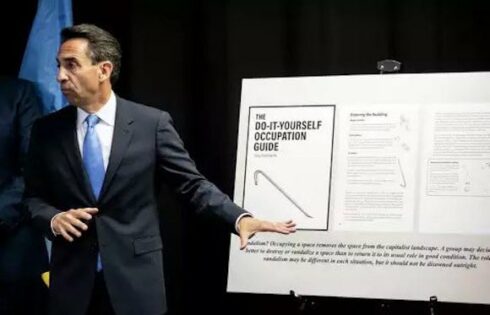
OPINION
A new no-smoking policy at San Diego State asks the campus community to practice “social enforcement,” advising students, faculty and staff to tell rule breakers to put out their butts, and if they don’t – tattle on them to university authorities.
So that got me thinking – what would the reaction be if we decided to ban junk food because it’s unhealthy, and practiced “social enforcement’” by asking every fat person: “Don’t you know how dangerous candy bars are? Put that Snickers down, now – before it kills you!”
Nearly 1,200 colleges across America forbid smoking cigarettes on campus, according to the American Nonsmokers Rights Foundation, and on Jan. 1, my school – San Diego State University – added its name to the long, growing list of universities that tell people how to live their lives.
“It is the expectation that the SDSU community will come together and practice ‘social enforcement,’ which refers to the establishment of a broadly shared norm and value within our community,” stated an email to the campus community announcing the smoking ban. “Members of the SDSU community will maintain the no smoking policy by engaging in direct, honest and supportive communication.”
The email was written by Vice President of Business and Financial Affairs Tom McCarron, who went on to acknowledge the possibility that ugly confrontations could arise from this so-called social enforcement.
“SDSU will neither encourage nor tolerate hostile interpersonal conduct related to the enforcement of this policy,” he stated. “If you encounter an employee who violates the policy and disregards your requests for them to stop, you should contact the Director’s Office at the Center for Human Resources.”
He then it lists off several telephone numbers and emails on where to tattle.
Let me be clear about one thing, lest you think I am biased in the matter, I have no personal stake. I am not a smoker, nor do I have any remote interest in becoming one. I settled my curiosity during my freshman year of college. I had one puff on a cigarette, proceeded to cough uncontrollably for several minutes, and decided that once was quite enough for me, thanks.
I also do not love the smell of cigarette smoke, and I try to avoid walking behind a smoker for prolonged periods of time, as having smoke blown in my face is rather unpleasant (though not nearly as unpleasant as being stuck behind someone walking at a snail’s pace.)
That being said, I was outraged when I read McCarron’s email. It seems the erosion of personal liberties, the nanny state, and now – the encouragement of telling on others to the authorities like some socialist regime – knows no bounds.
During my freshman year at SDSU in 2010, smoking was allowed everywhere on campus – except indoors. This is California, after all. Then, just in time for the 2011-12 academic year, a new policy was put into effect, banning smoking in all but 12 designated smoking areas.
Most of the spots were way out in the boonies. There was only one semi-centrally located area, right behind the theatre building. For most students or staff who wanted a smoke in the middle of the day, this was the place to go. Trust me, I know. I’m a stage manager at SDSU.
Non-smokers complained frequently about the pungent smell coming from the convergence of smokers there. To which I always replied that if people were allowed to smoke wherever, there would be no issue of a concentrated smell.
Perhaps it is in response to those complaints that the University Senate decided to completely ban all smoking on SDSU’s campus. I have a feeling, though, that a complete ban was always the ultimate goal, and that the intermediate step of designating areas was just to get us used to the idea of our liberties being infringed upon.
The explanation for the ban given in the e-mail is that “a smoke-and tobacco-free campus will contribute positively to the health and well-being of our students, faculty, staff and visitors.”
The University Senate is trying to protect us all from the dangers of second-hand smoke, which have been grossly overstated.
The idea that the amount of smoke breathed as a non-smoker passes a smoker has any deleterious effects is ridiculous. According to Dr. Michael Siegel, who is an advocate for smoking bans in restaurants, even a 20-30 minute exposure to secondhand smoke “is completely reversible, and it’s not going to cause hardening of the arteries.”
The crusade against smoking was aided by a 1992 Environmental Protection Agency report, which claimed that secondhand smoke kills approximately 3,000 non-smokers per year, by way of lung cancer.
But according to Dr. Jerome Arnett, a pulmonologist, the report’s conclusions are “not supported by conclusive scientific evidence.” According to him, all of the science surrounding secondhand smoke has been faulty, and the findings grossly overstated.
The most infuriating part of McCarron’s e-mail was this patronizing conciliation aimed at smokers: “People wishing to address their own personal smoking habits can find information on health and safety related to smoking, as well as cessation programs on the university’s smoking policy website smokefree.sdsu.edu.”
When I started reading the sentence, I actually thought there was going to be something helpful for smokers, maybe about areas just off campus where it is still permissible to smoke. But no. The e-mail just tells smokers that they should rethink their life choices; there is no place for them at SDSU.
College Fix contributor Emily Yavitch is a student at San Diego State University.
IMAGE: Anonymous9000/Flickr
Like The College Fix on Facebook / Follow us on Twitter





Please join the conversation about our stories on Facebook, Twitter, Instagram, Reddit, MeWe, Rumble, Gab, Minds and Gettr.